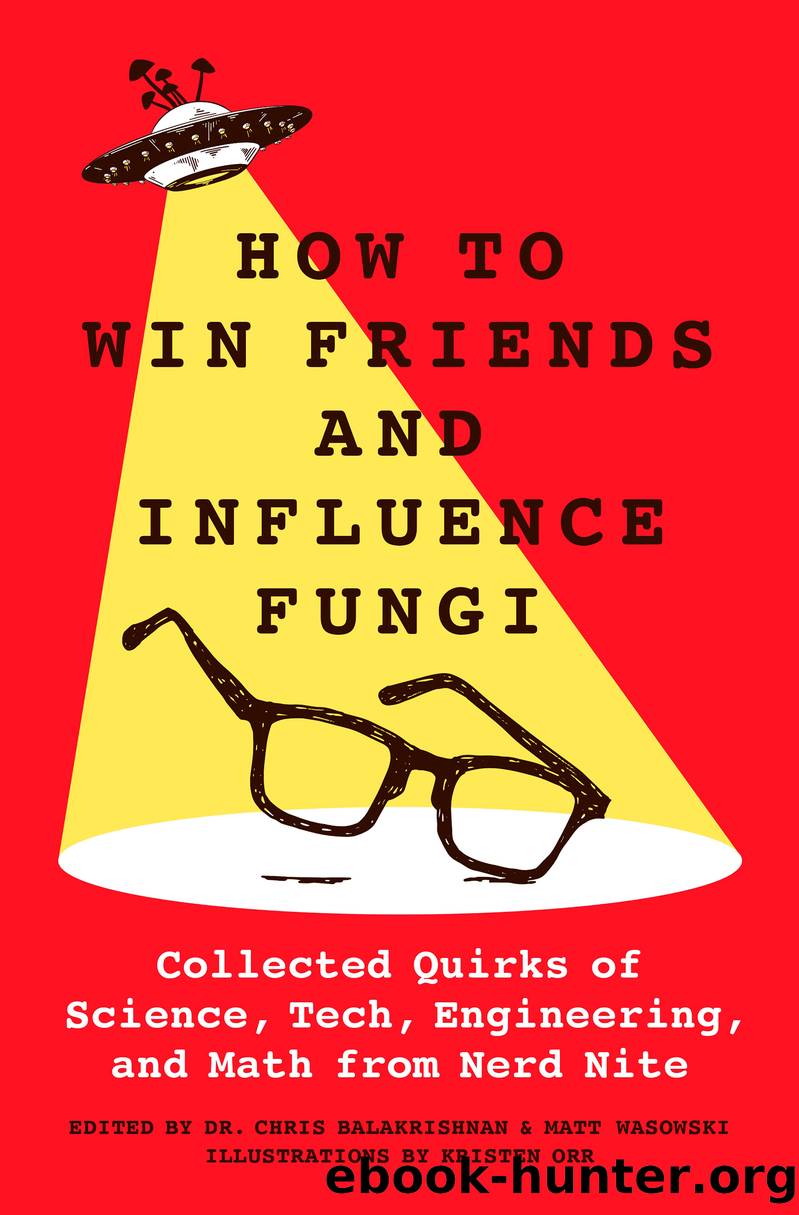How to Win Friends and Influence Fungi by Dr. Chris Balakrishnan

Author:Dr. Chris Balakrishnan
Language: eng
Format: epub
Publisher: St. Martin's Publishing Group
* * *
Jeremy Kay is former boss of Nerd Nite Boston. He is currently associate professor of neurobiology at Duke University. These days he mainly nerds out about the retina, but zombies will always be near and dear to his heart/brain axis.
NERD NITE MELBOURNE
HACKING THE ANTIVIRAL IMMUNE RESPONSE
by Dr. Ebony Monson
Several years after the height of the COVID-19 pandemic, many people know the telltale symptoms of a COVID-19 infection: a sore throat, a pernicious cough, congestion, fever, and full-body exhaustion. In fact, from the start of the pandemic through November 2022, SARS-COV-2, the virus responsible for the COVID-19 pandemic, had infected more than 600 million people worldwide and sadly killed 6.5 million, according to the World Health Organization. Unfortunately, this is not the worst pandemic we have seen, and itâs predicted it wonât be the last. Yet with all this attention and focus on COVID-19, not many people understand what a virus actually is and how your body reacts once you are infected.
So what is a virus?
A virus is an infectious microbe consisting of a segment of nucleic acids (either DNA or RNA) surrounded by a protein coat. In the case of respiratory viruses such as SARS-COV-2 or influenza, these non-living entities infect us by entering through our mouth or nose and then ultimately go on to hack our cells, turning them into machines for producing more copies of themselves. But what do our cells do to combat this infection? After a virus infects our cells, it doesnât take long for our immune system to detect and start fighting off these invaders. Our extremely complex immune response is very robust, and in general works well to clear viral infection, but viruses have evolved strategies to combat our immune response, and thatâs when we usually get sick.
Our bodyâs response to infection can be broken down into two stages. First is the innate immune response, which is activated immediately following infection, producing antiviral molecules that combat infection. And second, the adaptive immune response is activated later during infection and is responsible for ârememberingâ past infections. The second stage of the immune response is the most well known as this is the stage of your immune response that vaccines support. We all know that vaccines have been widely successful in the eradication of viruses such polio and smallpox, but during the COVID-19 pandemic we also learned how expensive and time-consuming they are to develop. Additionally, they are also specific to one virus and are often stain-specific, meaning that if the virus mutates, it will make that specific vaccine less effective.
As the COVID-19 pandemic persists, scientists around the world are working tirelessly to outsmart new variants and plan for the next virus with pandemic potential. One way in which we can do this is by developing antiviral drugs targeted to our own immune response, instead of targeting the virus itself. That is, manipulating the first innate stage of our immune response, which is activated immediately following infection.
This means we can boost our immune response
Download
This site does not store any files on its server. We only index and link to content provided by other sites. Please contact the content providers to delete copyright contents if any and email us, we'll remove relevant links or contents immediately.
Spell It Out by David Crystal(35361)
Professional Troublemaker by Luvvie Ajayi Jones(28971)
We're Going to Need More Wine by Gabrielle Union(18086)
The Secret History by Donna Tartt(16663)
Cat's cradle by Kurt Vonnegut(13896)
The Goal (Off-Campus #4) by Elle Kennedy(12449)
The Social Justice Warrior Handbook by Lisa De Pasquale(11494)
The Break by Marian Keyes(8615)
Crazy Rich Asians by Kevin Kwan(8372)
Thirteen Reasons Why by Jay Asher(7803)
The remains of the day by Kazuo Ishiguro(7577)
Educated by Tara Westover(7079)
The handmaid's tale by Margaret Atwood(6875)
Win Bigly by Scott Adams(6328)
Giovanni's Room by James Baldwin(5896)
This Is How You Lose Her by Junot Diaz(5800)
Six Wakes by Mur Lafferty(5213)
The Rosie Project by Graeme Simsion(5201)
The Last Black Unicorn by Tiffany Haddish(5082)
